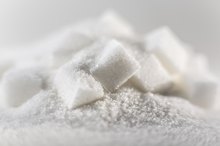The Glucose Free Diet
Glucose is a type of sugar formed inside the body during the process of digestion. When carbohydrates are consumed, the body breaks it down into molecules, a specific type of sugar. Glucose is the body’s main form of energy; it supplies the body with the fuel it needs to function. Since carbohydrate consumption is directly responsible for glucose production, diets that eliminate carbohydrates can be considered glucose free diets. Although these diets may seem appealing, certain dangers do exist.
Carbohydrate Dangers
Sugar and refined white flours are often considered empty calories. During the refining process, all of the nutrients are stripped away from the substances. By the time they reach our foods, they have essentially no nutritional value. When too many of these foods are consumed, the diet becomes deficient in vitamins and minerals. To make up for this deficiency, the beneficial substances are taken from the body’s reserves. As a result, the body’s organs, bones, muscles and immune system become weaker.
- Sugar and refined white flours are often considered empty calories.
- When too many of these foods are consumed, the diet becomes deficient in vitamins and minerals.
High-Glucose Foods
What Causes a Sugar Rush?
Learn More
Some carbohydrate food are broken down into glucose very quickly and are considered “high glucose foods.” These high-glucose foods include foods made with white sugar or refined white flour, such as candy, soft drinks, pastries, pasta, potatoes, sweetened fruit juices and sugary cereals. These foods provide the body with a quick spike in energy, followed rapidly by an energy decline.
Low-Glucose Foods
Other foods, however, are broken down into glucose very slowly and are considered “low glucose foods.” When consumed, these foods provide the body with a steady supply of energy throughout the day. Low-glucose foods include beans, nuts, seeds and a wide variety of vegetables, such as cucumber, broccoli, cabbage, artichokes, asparagus and leafy greens.
Diet Dangers
Foods Containing Glucose or Fructose
Learn More
Since the body relies on glucose for energy, a glucose free or carbohydrate free diet can actually be quite dangerous. When glucose levels are deficient, the body goes into a state of ketosis. During the state, the body breaks down fat stores into ketone bodies for energy. Although this fat-breakdown may seem appealing to someone trying to lose weight, the process is dangerous. As ketone bodies accumulate, they make the blood more acidic and cause damage to internal organs. Speak with a physician before initiating a diet that severely limits carbohydrates or glucose. Your doctor will likely recommend monitoring your ketone levels regularly to ensure safety.
- Since the body relies on glucose for energy, a glucose free or carbohydrate free diet can actually be quite dangerous.
Alternative
Rather than eliminating all carbohydrates from the body, simply eliminate the high-glycemic carbohydrate foods with empty calories and little nutrition. Avoid processed and prepackaged foods, which generally contain high amounts of refined sugar. When eating bread or pasta, opt for whole-grain options made with unrefined whole wheat flour. If you are missing the sweet flavors of candy, indulge in the healthy sugars contained in fresh fruit.
- Rather than eliminating all carbohydrates from the body, simply eliminate the high-glycemic carbohydrate foods with empty calories and little nutrition.
Related Articles
References
- SixWise: If You Avoid Eating Glucose You May Actually Live Longer
- Tornheim K. Glucose metabolism and hormonal regulation. In Encyclopedia of Endocrine Diseases (Second Edition). Editors, Ilpo Huhtaniemi and Luciano Martini. Cambridge, Mass.: Academic Press, September 12, 2018 https://www.elsevier.com/books/encyclopedia-of-endocrine-diseases/9780128122006
- Schugar RC, Crawford PA. Low-carbohydrate ketogenic diets, glucose homeostasis, and nonalcoholic fatty liver disease. Curr Opin Clin Nutr Metab Care. 2012;15(4):374–380. doi:10.1097/MCO.0b013e3283547157
- Hartman AL, Rho JM. Beyond epilepsy: Ketogenic diet use in other disease states. In Dietary Treatment of Epilepsy: Practical Implementation of Ketogenic Therapy. New York: John Wiley and Sons 2013, pp. 225-231. https://doi.org/10.1002/9781118702772.ch28
- Paoli A, Rubini A, Volek JS, Grimaldi KA. Beyond weight loss: a review of the therapeutic uses of very-low-carbohydrate (ketogenic) diets [published correction appears in Eur J Clin Nutr. 2014 May;68(5):641]. Eur J Clin Nutr. 2013;67(8):789–796. doi:10.1038/ejcn.2013.116
- Watanabe M, Tozzi R, Risi R, et al. Beneficial effects of the ketogenic diet on nonalcoholic fatty liver disease: A comprehensive review of the literature. Obes Rev. 2020; doi:10.1111/obr.13024
Writer Bio
Krista Sheehan is a registered nurse and professional writer. She works in a neonatal intensive care unit (NICU) and her previous nursing experience includes geriatrics, pulmonary disorders and home health care. Her professional writing works focus mainly on the subjects of physical health, fitness, nutrition and positive lifestyle changes.









